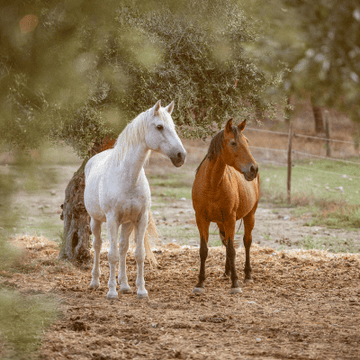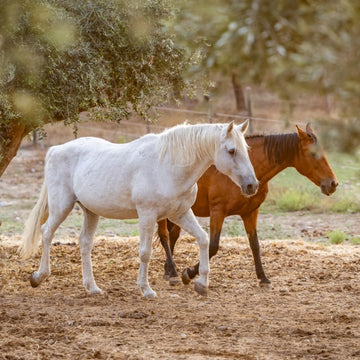Given the various limitations and challenges a senior horse may face, its feeding management must be carefully adjusted to help maintain body condition, which can be a real challenge at this stage of life.
Water
Monitoring water intake is essential in senior horses.
-
In winter, cold water may discourage drinking, so it's important to ensure hydration needs are met.
-
In summer, increased temperatures require greater water intake to maintain proper hydration.
Adding electrolytes to the diet can be a helpful strategy.
Forage
Forage is a vital component of the diet. For senior horses, it is especially important to use high-quality forage, since both intake and digestive efficiency may be reduced — particularly when dental issues are present.
If forage is sufficient to meet energy requirements, then a balancer should be added to provide protein (especially lysine), vitamins, and minerals in appropriate amounts.
If forage is not sufficient, you should consider adding a senior feed and/or a fat-based supplement (such as linseed oil) to increase energy intake. Choose mash-style feeds, which are easier to chew and digest for horses with dental difficulties.
If forage consumption is compromised due to dental problems, you can replace it with forage-based pellets or cubes soaked in water.
Concentrate Feeds
Senior-specific concentrate feeds generally include fibrous ingredients like alfalfa or beet pulp, and are formulated to be fed in larger quantities than standard feeds, thus providing part of the fiber requirement.
Because protein absorption declines with age, senior feeds should have:
-
A higher protein content
-
Be a good source of lysine (the most limiting amino acid for horses)
The inclusion of fat helps increase the caloric density without raising non-structural carbohydrates (NSC), such as starch and sugars. This is especially important for horses with Cushing’s disease or insulin resistance.
Senior horses may also suffer from reduced digestive efficiency, so the levels of vitamins and minerals in their feed should be adapted.
They are also more prone to oxidative stress, so adequate levels of antioxidants like vitamins C and E should be ensured.
Supplementation
Supplementing with probiotics can be beneficial.
For horses with joint conditions, the use of chondroprotective supplements is also advisable.

